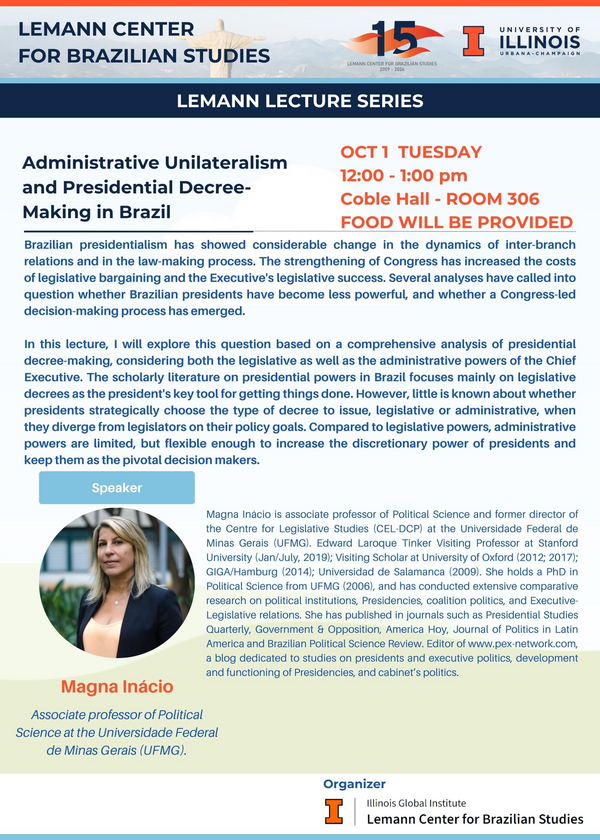
Lemann Lecture Series | Magna Inácio | Administrative Unilateralism and Presidential Decree-Making in Brazil
- Event Type
- Lecture
- Sponsor
- The Lemann Center for Brazilian Studies
- Location
- Coble Hall 306
- Date
- Oct 1, 2024 12:00 - 1:00 pm
- Speaker
- Magna Inácio is associate professor of Political Science and former director of the Centre for Legislative Studies (CEL-DCP) at the Universidade Federal de Minas Gerais (UFMG). Edward Laroque Tinker Visiting Professor at Stanford University (Jan/July, 2019); Visiting Scholar at University of Oxford (2012; 2017); GIGA/Hamburg (2014); Universidad de Salamanca (2009). She holds a PhD in Political Science from UFMG (2006), and has conducted extensive comparative research on political institutions, Presidencies, coalition politics, and Executive-Legislative relations. She has published in journals such as Presidential Studies Quarterly, Government & Opposition, America Hoy, Journal of Politics in Latin America and Brazilian Political Science Review. Editor of www.pex-network.com, a blog dedicated to studies on presidents and executive politics, development and functioning of Presidencies, and cabinet’s politics.
- Contact
- Lemann Center
- lemann@illinois.edu
- Views
- 99
- Originating Calendar
- Lemann Center Events
Brazilian presidentialism has showed considerable change in the dynamics of inter-branch relations and in the law-making process. The strengthening of Congress has increased the costs of legislative bargaining and the Executive's legislative success. Several analyses have called into question whether Brazilian presidents have become less powerful, and whether a Congress-led decision-making process has emerged.
In this lecture, I will explore this question based on a comprehensive analysis of presidential decree-making, considering both the legislative as well as the administrative powers of the Chief Executive. The scholarly literature on presidential powers in Brazil focuses mainly on legislative decrees as the president's key tool for getting things done. However, little is known about whether presidents strategically choose the type of decree to issue, legislative or administrative, when they diverge from legislators on their policy goals. Compared to legislative powers, administrative powers are limited, but flexible enough to increase the discretionary power of presidents and keep them as the pivotal decision makers.
I will present the results of ongoing research which shows that the use of these types of decrees varies among Brazilian presidents, depending on the political and institutional constraints each one faces. Using machine learning techniques to uncover the content of these decrees, our results show that presidents resort to administrative unilateralism to pursue policy goals. Our results also show that presidents use diverse strategies when issuing administrative decrees. Selective implementation of laws, with partial regulation of their content via decree, is used when the president diverges from the congressional decision. Revision of previous decrees is also used to reshape policies without the incurring the costs of passing new legislation. In this way, we shed light on presidential decree-making in Brazil, which goes beyond legislative action and allows presidents strategically to tackle less friendly inter-branch relations.
Food will be provided.